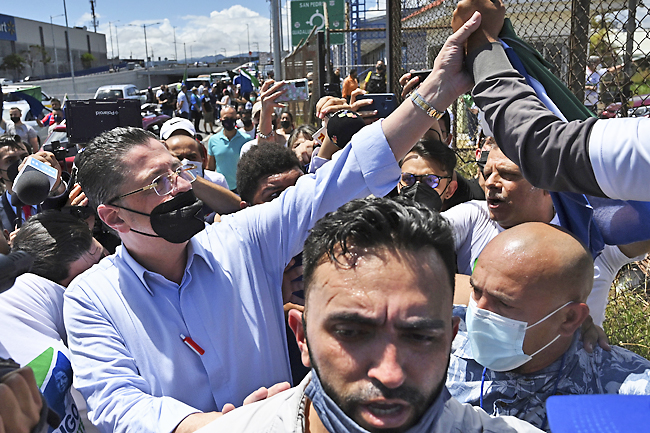AN JOSE, COSTA RICA (AP) – A former finance minister who surprised many by making it into Costa Rica’s presidential runoff vote has easily won that ballot and is to become the Central American country’s new leader next month, while still fending off accusations of sexual harassment when he worked at the World Bank.
With nearly all polling stations reporting late Sunday, conservative economist Rodrigo Chaves had 53 per cent of the vote, compared to 47 per cent for former President José Figueres Ferrer, the Supreme Electoral Tribunal said. More than 42 per cent of eligible voters did not participate in Sunday’s election, however, reflecting the lack of enthusiasm Costa Ricans had for the candidates.
In his victory speech, Chaves said he received the result with humility and called for unity to address problems like unemployment and a soaring budget deficit.
“For me this is not a medal nor a trophy, but rather an enormous responsibility, heaped with challenges and difficulties that we will all resolve,” he said. “Costa Rica, the best is to come!” Chaves said before celebrating supporters. His inauguration is scheduled for May 8.
Figueres conceded defeat less than an hour after results began to come in. He had led the first round of voting on February 6, with Chaves in second that day. Neither had come close to the 40 per cent of the vote needed to avoid a runoff.

“Costa Rica has voted and the people have spoken,” Figueres said. “As the democrats we are we will always be respectful of that decision.”
He congratulated Chaves and wished him the best, adding that continues to believe that Costa Rica is in a “deep crisis” and he is willing to help it recover.
Figueres, who was Costa Rica’s president from 1994 to 1998, represents the National Liberation Party like his father, three-time president José Figueres Ferrer. Chaves served briefly in the administration of outgoing President Carlos Alvarado and represents the Social Democratic Progress Party.
More than 3.5 million Costa Ricans were eligible to vote, but with many voters underwhelmed by the options, turnout was even lower than the 60 per cent in February.
Lines formed before voting started at some polling places in San Jose, the capital, while others appeared nearly empty.
Political analyst Francisco Barahona said Costa Ricans’ lack of enthusiasm was the result of the multitude of personal attacks that characterised the campaign.
“In the debates they only heated things up in personal confrontations, mistreatment of each other,” he said. “They didn’t add depth to their proposals to resolve the country’s problems.”



















































